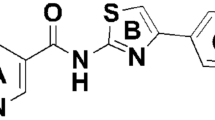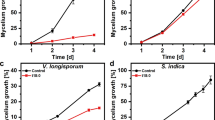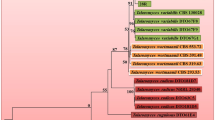Abstract
CERTAIN amino-acids, such as L-threo-β-phenylserine, have been shown to reverse the action of indoleacetic acid on root growth of cucumbers, bud development of beans and epinasty of tomatoes. It was thought that a relation might exist between the activity of such compounds as auxin antagonists and their chemotherapeutic activity against certain fungal diseases including cucumber scab1.
This is a preview of subscription content, access via your institution
Access options
Subscribe to this journal
Receive 51 print issues and online access
$199.00 per year
only $3.90 per issue
Buy this article
- Purchase on Springer Link
- Instant access to full article PDF
Prices may be subject to local taxes which are calculated during checkout
Similar content being viewed by others
References
van Andel, O. M., Phytopathol. Z., 45, 66 (1962).
van Andel, O. M., Tijdschr. Plantenziekten, 64, 307 (1958).
Halevy, A. H., Plant Physiol., 38, 731 (1963).
Elema, J., thesis, Univ. Utrecht (1960).
Author information
Authors and Affiliations
Rights and permissions
About this article
Cite this article
VAN ANDEL, O. Mode of Action of L-Threo-β-phenylserine as a Chemotherapeutant of Cucumber Scab. Nature 211, 326–327 (1966). https://doi.org/10.1038/211326a0
Issue Date:
DOI: https://doi.org/10.1038/211326a0
This article is cited by
-
Shifts in disease resistance induced by growth regulators
Netherlands Journal of Plant Pathology (1968)
-
Studies on the mode of action of phenylthiourea, a chemotherapeutant for cucumber scab
Netherlands Journal of Plant Pathology (1968)
Comments
By submitting a comment you agree to abide by our Terms and Community Guidelines. If you find something abusive or that does not comply with our terms or guidelines please flag it as inappropriate.



